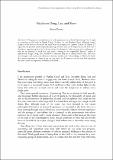Files in this item
Replies to Deng, Lee, and Skow
Item metadata
| dc.contributor.author | Prosser, Simon | |
| dc.date.accessioned | 2019-04-04T23:38:02Z | |
| dc.date.available | 2019-04-04T23:38:02Z | |
| dc.date.issued | 2018 | |
| dc.identifier | 251138318 | |
| dc.identifier | a279a0c0-9d5e-40f3-b669-245c96eb686f | |
| dc.identifier | 85031127982 | |
| dc.identifier | 000424762500006 | |
| dc.identifier.citation | Prosser , S 2018 , ' Replies to Deng, Lee, and Skow ' , Inquiry - An Interdisciplinary Journal of Philosophy , vol. 61 , no. 3 , pp. 328-350 . https://doi.org/10.1080/0020174X.2017.1385163 | en |
| dc.identifier.issn | 0020-174X | |
| dc.identifier.other | ORCID: /0000-0001-7444-2782/work/67525840 | |
| dc.identifier.uri | https://hdl.handle.net/10023/17455 | |
| dc.description.abstract | This paper is a contribution to a book symposium on my book Experiencing Time. I reply to comments on the book by Natalja Deng, Geoffrey Lee and Bradford Skow. Although several chapters of the book are discussed, the main focus of my reply is on chapters 2 and 6. In chapter 2 I argue that the putative mind-independent passage of time could not be experienced, and from this I develop an argument against the A-theory of time. In chapter 6 I offer one part of an explanation of why we are disposed to think that time passes, relating to the supposedly ‘dynamic’ quality of experienced change. Deng, Lee, and Skow’s comments help me to clarify several issues, add some new thoughts, and make a new distinction that was needed, and I acknowledge, as I did in the book, that certain arguments in chapter 6 are not conclusive; but I otherwise concede very little regarding the main claims and arguments defended in the book. | |
| dc.format.extent | 23 | |
| dc.format.extent | 201590 | |
| dc.language.iso | eng | |
| dc.relation.ispartof | Inquiry - An Interdisciplinary Journal of Philosophy | en |
| dc.subject | Time | en |
| dc.subject | Temporal Experience | en |
| dc.subject | Passage of time | en |
| dc.subject | Specious present | en |
| dc.subject | A-theory | en |
| dc.subject | B-theory | en |
| dc.subject | Peception | en |
| dc.subject | B Philosophy (General) | en |
| dc.subject | T-NDAS | en |
| dc.subject.lcc | B1 | en |
| dc.title | Replies to Deng, Lee, and Skow | en |
| dc.type | Journal article | en |
| dc.contributor.institution | University of St Andrews. Philosophy | en |
| dc.identifier.doi | 10.1080/0020174X.2017.1385163 | |
| dc.description.status | Non peer reviewed | en |
| dc.date.embargoedUntil | 2019-04-05 |
This item appears in the following Collection(s)
Items in the St Andrews Research Repository are protected by copyright, with all rights reserved, unless otherwise indicated.

